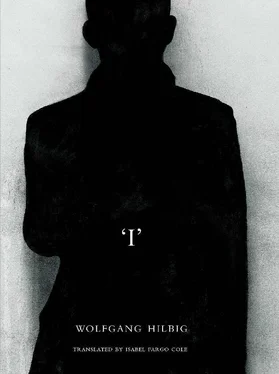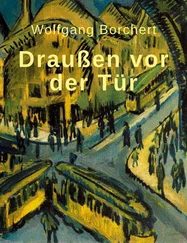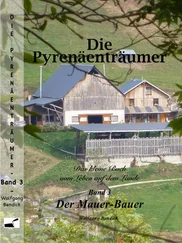First he’d had to travel back and forth several times between Berlin and the town of A., the fog still seeming to swathe his brow, the frosts of the night streets still gripping his limbs and the smoke still stinging his eyes. . when at last he walked down the Berlin street where he meant to live, the first pale green bloom was on the lindens. They lined the pavement of a tiny side branch of a larger thoroughfare, the main artery of an outlying southern neighbourhood, already in Berlin’s periphery. When all hope had seemed lost, he’d found a rental room here: he refused to see it as more than a lucky coincidence. And it was in this neighbourhood that the city showed him its bright and spacious side. . the first confirmation of the words in his head: he thought he was looking from the dark into the light.
He’d spent more than a week looking in vain for a place to stay. . albeit in the clumsiest possible fashion: at a loss for ideas, he’d gone knocking at the doors of total strangers. . each time he’d seen himself leaning rebuffed on the doorframe, just a bit shorter than the lanky ‘probationer’—as the boss denoted the mode of existence W. had now escaped. . each evening, frazzled and filled with feelings of futility, he’d returned to the town, almost sick with fear of running into the boss again, and the next morning he’d set out for Berlin once more; it was nearly four hours by train. Once he’d had to take a day’s break, meaning to use it to finally hand in his notice at the factory; he’d failed, sleeping all day. And then, in the ghastliest exhaustion, he recalled an address he’d forgotten because from the start he’d thought it was a fiction. One of his shady pub companions had given it to him once (‘Just for a weekend in Berlin!’), and he’d been carrying it around with him for a year now. Searching his papers, he actually found it — apparently Harry, Cindy’s boyfriend, had lodged there when he wound up in Berlin in the brief interims between prison terms; the woman who rented out the room seemed to be a relative of his. — And this room was in fact still free; it was on the ground floor, poorly furnished (a cot, a chair, an armchair, an inadequate washbasin. . the only table was a bulky desk), and as it couldn’t be heated, it would be virtually uninhabitable in winter.—W. had told the woman, who seemed mistrustful, something he’d meant not to tell, but he felt he owed her an explanation: I work as a writer, I need the room on the side, so I can have some peace and quiet. — That’s more or less what the previous tenant claimed, she replied. — Could he have the room for longer than a weekend, too? — If necessary, she said, still mistrustful. But then he’d have to go and fill out his registration, within ten days at the latest, otherwise she’d get into trouble.—W. paid the rent for the next three months (a comparatively laughable sum) and explained to the astonished woman that he probably couldn’t be there all the time, but she’d have to keep the room free for him. — The woman tucked away the money as quickly as though he might reconsider the deal that very moment. If he didn’t want to take his turn cleaning the stairwell, she said, he’d have to add nine marks for the three months. — He gave her another ten-mark note, told her to keep the change, and withdrew with the key. That evening he took the train home again to fetch the absolute necessities and a small stockpile of books. The whole time the situation felt utterly familiar. . it couldn’t be, since he’d never left his town for long: but often, in his short narrative pieces, he’d tried to describe characters in a similar position. He’d contrived figures who arrived with a sense of liberation in some new setting, at long last, after unduly long attempts to free themselves from their habitual circumstances. . and he’d always meticulously described the changes, indeed the transformations, that took place in such a character at that moment.
When he was back in Berlin two days later — after long arguments with his mother, who had realized he was serious about the move, and watched pale-faced as he packed his bags. . After all Leipzig wasn’t far, just an hour by bus, he’d told her, but his attempts at reassurance were fruitless — when, laden with the two heavy bags, he finally reached the little street again, he saw in the gathering darkness that the light was on in his ground-floor room. Probably that was why he’d walked past it several times already. . for a long time, almost all afternoon, he’d searched the neighbourhood’s short, identical-looking side streets, scanning all the facades behind the bare front gardens; he hadn’t found his building. . and he couldn’t find the piece of paper with the address in his bags. Of course he remembered the name of the street, but every time he was about to ask a passer-by, the person suddenly seemed suspicious. . afterwards he looked back on this afternoon as on an episode of madness. He’d told himself that from now on he’d have to find his way in the capital alone, he’d have to, and better than anyone else, as quickly as possible he had to become an expert at urban orientation (a resolution he couldn’t even have fulfilled in his home town). . and so he’d failed in every way on this first day in Berlin; it was a bad omen for his fresh beginning. He’d worked up a sweat in the spring breeze which blew about the not very urban-looking houses (and which wasn’t exactly warm); soon he was completely sodden and at the point of seeking the train station again. . and there he was, standing in front of his room’s lit window, standing for what had clearly been quite some time, staring into the stopgap interior of which he had a full view from the pavement. . had he seen a human form in the room just now? Now he recognized it by the gigantic, bright red plush armchair which, completely incongruous, took up the middle of the room, flooded by the light of the burning bulb. . he’d forgotten to turn out the light when he left two days ago! — Towards noon the next day he woke up in the plush armchair, and darkness filled the room.
His torso produced a sharp crunching noise when he moved against the back of the chair; his shoulders, hair and upturned face were covered with the shards of the light bulb, which at some point that night, unable to cope with the unbroken supply of electricity, had burst. He recalled that on returning to the room he’d let down the blind, then collapsed into the armchair and immediately fallen asleep.
And the crack of the bursting bulb had entered his sleep once, deep though that sleep had been; dimly he thought he recalled the explosion, breaking through faintly as though from a remote terrain. . the aerial mines exploding in the streets must have sounded like that, when in the war’s final years he sheltered with his mother in the cellar. . probably he couldn’t really recall this time; it was in the first three years after his birth. . but he vividly recalled the target of those air raids, the bombed-out industrial plants outside town, the playground and exploration zone of his childhood.
The memory of the sound of the bombs hitting is probably the idea of a memory, he thought. . often the idea of a dream’s content is more vivid than the dream itself. . and it occurred to him that he must have dreamt of his acquaintance Cindy that night: in this dream he was somehow embroiled in the fairly hair-raising story of how Cindy had had her baby. Suddenly the waters had broken from her body, in a muffled explosion like a fountain, and the walls of the room were sprayed with the slick, shimmering liquid, and the room was a closed cavern, a cramped cellar, a cell. . no one believed what was going on, her distress was ignored — and in the dream W. was among the few who wanted to get help. . but only partly; partly he was on the side of those who saw Cindy’s cries for help as a cheap trick. The dream’s clearest manifestation was the breaking of the waters. . in his thoughts a clinking spray had fallen: the light bulb!
Читать дальше












